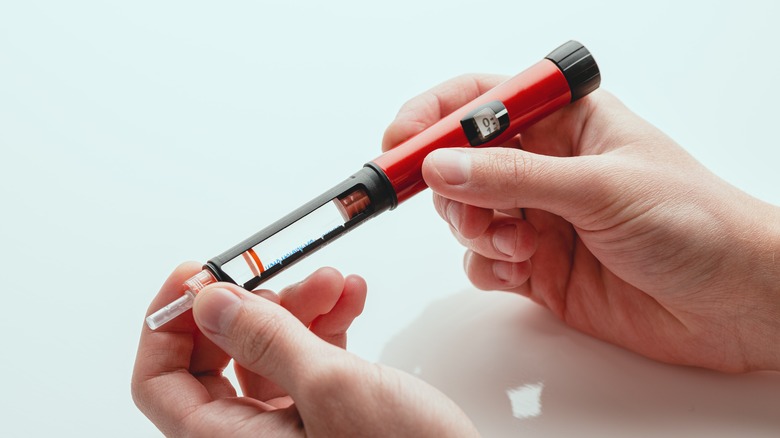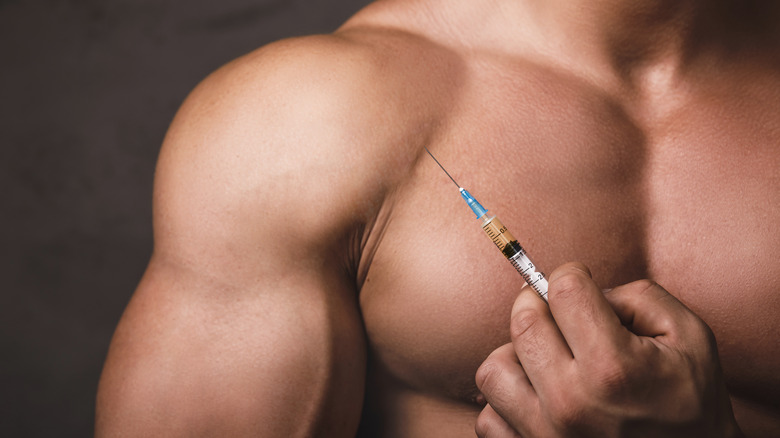The Real Effects Testosterone Has On Your Body
Hormones influence many aspects of the human body and the way it functions. Testosterone is known to many as "the" male hormone, but it's important to both males and females for a variety of reasons. During puberty, testosterone plays a role in the development of adolescent males, says an article from Harvard Health. It's not limited to males, though. Testosterone also helps females develop and plays a role in things like bone health throughout life.
Both men and women can develop problems from high or low testosterone levels, meaning the balance of this hormone is important in both sexes. It factors into the development of the brain as well as the body, and can have an effect on mood and personality in men. Testosterone is also well-known for its illegal use in the form of anabolic steroids. The effects of these illegal testosterone supplements are different from what can be achieved with normal testosterone levels. If you've ever been curious about the effects of testosterone on your body, keep reading.
Testosterone builds muscle
Building muscle is perhaps the thing that testosterone is best known for. A paper published in Frontiers in Physiology explains how testosterone is involved in building muscle. Testosterone is made from cholesterol, and is stored in Leydig cells in men and in the ovaries and adrenalzona fasciculata in women. Interestingly, men and women have equal amounts of testosterone circulating in their muscles.
There are a few things that show the importance of testosterone for building muscle. The first is that supplemented testosterone leads to more muscle growth. The second is that a testosterone deficiency makes it harder to build muscle. The third is that when testosterone can't bind to the proper receptors, it's harder to build muscle. For those reasons, the researchers deem testosterone vital to build muscle in adult males and females.
A study published in Biogerontology shows that building and maintaining muscle mass is important if you want to age well. Unfortunately, it gets harder and hard to build muscle as you get older. Women who want to live healthy lives should build muscle, and an important part of doing so is testosterone. As women age, their testosterone levels naturally drop, as does the amount of muscle mass they have. One way to combat this is with resistance training, according to a paper published in Sports Medicine. The researchers found that an intense weight training workout boosted testosterone levels in women significantly, which could help fight the aging-related loss in muscle mass.
Testosterone burns fat
Two common fitness goals are muscle building and fat loss. Testosterone helps with both. While there are many things that can lead to fat gain and fat loss (including activity and diet), testosterone levels could be a factor. A study published in Obesity Reviews found that people with low testosterone levels tended to have higher levels of body fat. They also found that giving supplemental testosterone to people with low levels helped them lose body fat.
It might seem strange that a single hormone can have an effect on your body fat levels. That's because weight gain and weight loss is largely dependent on something called energy balance, according to a paper published in European Endocrinology. In other words, the amount of calories you burn and the amount of calories you consume throughout the day determine how much weight you gain or lose. The study in Obesity Reviews suggests that testosterone helps your body burn more energy by making you more active and boosting your metabolism.
Testosterone improves sexual function
Outside of the gym, testosterone levels play an important role in many aspects of daily life. For men and women, it plays an important role in the bedroom.
A study published in Endocrine Reviews explains the role that testosterone plays in the sex lives of men. The study, which was conducted on an group of men with low testosterone, experimented to see how boosting testosterone levels changed different things in their bodies. The researchers saw improvement in sexual desire, sexual activity, and erectile function. Low testosterone levels can also affect women. In particular, women who are postmenopausal can feel a decline in sexual desire.
Meanwhile, a study published in Therapeutic Advances in Endocrinology and Metabolism discusses testosterone therapy in women with low levels as a potential solution for low sexual desire. However, the researchers are careful to mention that no such therapy is approved. There are such therapies for men, though.
Testosterone makes men more aggressive
According to 2012 crime statistics from the FBI, men commit roughly 74% of crimes that take place in the United States. When it comes to violent crimes, men commit an even higher percentage. While there are a variety of factors that lead to men committing more crimes than women, one answer could be testosterone.
While females have testosterone, it's much more predominant in males, and it can change the way they act. A study published in the International Journal of Endocrinology & Metabolism explains how testosterone can increase aggression in males. The authors describe a triad comprised of three things that can alter aggressive behavior. The first is testosterone, which can make males more aggressive by activating areas of the brain that control aggression. Cortisol and serotonin counteract the effects that testosterone has, balancing out aggressive behavior. Any alteration in this triad can affect aggressive behavior, as the researchers explain.
What happens when men have low testosterone
Too much testosterone can cause problems in men, such as aggression. Low testosterone levels can also cause a variety of problems in men.
An article from the Urology Care Foundation lists some of these problems. Low sex drive and erectile dysfunction are two sexual problems men can face. Irritability and depression are two mental problems associated with low testosterone levels. Finally, a loss of muscle mass and fatigue are physical symptoms that men should watch out for.
If you're experiencing one or more of these symptoms, you should consult your doctor. To figure out if your testosterone levels are off, they will likely suggest a blood test. Having low testosterone is typically defined as having levels below 300 nanograms per deciliter. Since testosterone levels tend to decline with age, these problems typically occur in older men. If you have low testosterone levels, your doctor might recommend testosterone therapy.
What happens when men have high testosterone
A health balance of testosterone levels is important in men. Too little of the hormone causes problems, as does having too much.
In adult men, testosterone blood tests are typically ordered if low levels of the hormone are suspected, says an article from MedlinePlus. However, high testosterone can be indicative of serious problems. In boys, early puberty is a sign that they have high testosterone levels. In some cases, this is caused by a serious issue, such as cancer in the testicles or adrenal glands.
Meanwhile, aggression in adult men could be caused by high testosterone levels. It could also weaken the immune system, suggests Stanford Medicine. According to the article, researchers have found that men with high testosterone levels responded poorly to an influenza vaccine. High testosterone levels in adult men could be caused by cancer in the testicles and adrenal glands (per MedlinePlus).
Testosterone increases insulin sensitivity
Diabetes is a serious health problem and is spreading rapidly. It's becoming so widespread that a study from the Journal of Endocrinology suggests that it has epidemic proportions. In the study, the researchers investigate the link between testosterone and diabetes. They note that many men with type 2 diabetes also have low testosterone levels. Interestingly, obesity can lower testosterone levels, and the authors offer this as one explanation.
In men with type 2 diabetes who have low testosterone, the authors noted a significant improvement when they were given testosterone therapy. Therefore, they conclude that testosterone can play an important role in reducing and preventing type 2 diabetes in men. One explanation could be that testosterone increases insulin sensitivity. People who have type 2 diabetes have trouble regulating their blood sugar, in part because their insulin doesn't work properly. Testosterone can improve the effectiveness of their insulin, explain the authors.
Testosterone boosts sex drive in women
In men, testosterone plays an important role in their sexual function. The same is also true for women. A study published in The Lancet's Diabetes & Endocrinology notes that testosterone is an essential hormone for women. When levels are too low, one possible side effect is loss of sexual desire. The researchers note that this can cause problems in the lives of women, and there has been some research exploring testosterone therapy to remedy this issue.
While it seems that supplementing with extra testosterone boosts sex drive in women who had previously low levels, there isn't enough research to conclusively prove this. The researchers note that there might be other benefits beyond sexual desire, such as improved muscular health and cognitive function for women who are postmenopausal. However, women who are experiencing low sexual drive could test their testosterone levels to see if that's a possible cause.
Testosterone improves bone health in women
Bone health is important to think about, especially for women. Osteoporosis, which causes bones to become weaker and more brittle, is more prevalent in women than men, according to the National Health Services. In particular, the hormonal changes from menopause are more likely to cause bones to weaken. One hormone that causes a change is oestrogen, which is essential for strong bones.
Another hormone that women need to keep their bones healthy is testosterone, says an article from Harvard Health. Evidence of the importance of testosterone in bone health for women is discussed in an article from the National Institutes of Health. In the cited study, young women with primary ovarian insufficiency who were given testosterone therapy were able to restore their bone levels back to normal, making them less vulnerable to fractures. They were also given a hormone called estradiol, which is important for bone health.
Testosterone is linked to risky behavior
A game of poker is a prime example of risk taking. There's some skill involved, as well as a lot of luck. Players can bet on each hand, and sometimes a player chooses to go "all in," which means they bet everything they have. This is an example of financial risk-taking, which might be related to the amount of testosterone you have in your body. The possible link is explored in a study published in Psychoneuroendocrinology.
In the study, the researchers had men play a chance-based game, which is similar to gambling, and measured their testosterone levels. They found that men with higher testosterone tended to take more risks in the game. Surprisingly, men who lost in the games didn't change the amount of risk they took in the future. That means a man with high testosterone is more likely to take financial risk, even if he's lost in the past. A study published in Frontiers in Behavioral Neuroscience explains that if women are given a testosterone supplement, they are likely to experience the same willingness to take financial risks.
Testosterone drops in men with children
Men might notice a shift in their behavior and the way they feel after they have children. There's a natural drop in testosterone levels as men age, according to an article from the American Psychological Association. Testosterone levels also fluctuate throughout the days, months, and seasons. These changes can alter mood and sexual desire in men. There's also a phenomenon called "andropause," which is similar to menopause in women, but relates to an aging-related drop in testosterone levels in men.
Having children is another cause of altered testosterone levels. The article explains that levels drop after men enter committed relationships or have children. On the other hand, testosterone levels spike when men are talking to a woman who's ovulating. In fact, men who sniffed shirts that were worn by women who were ovulating had a spike in testosterone. However, these effects could be different for gay men, according to psychologist Dr. Aaron Lukaszewski (per the American Psychological Association).
Testosterone helps boys develop in puberty
The sex hormones, of which testosterone is perhaps the most important in men, helps shape adolescents as they go through puberty.
Before boys hit puberty, their testosterone levels are actually quite low, says an article from Kaiser Permanente. As they hit puberty and testosterone starts to increase, they begin to develop secondary sex characteristics. In girls, testosterone is also produced during puberty, but in small amounts. It affects the way the brain develops, bones, muscles, and sexual functioning, among other things.
One of these characteristics is that the boy's voice will drop to a lower pitch. They'll also start to produce sperm, grow facial hair, and grow body hair. In men, testosterone levels remain high for a while, peaking at around age 40. A gland in the brain called the pituitary gland regulates testosterone levels. If they drop too low, it releases what's called a luteinizing hormone. This sends a signal to the testicles to release more testosterone.
Testosterone converts to estradiol in men
Not all of the testosterone that men make is used by the body. When there's an excess buildup, something has to happen to the hormone.
The body converts some of it to estradiol, explains an article from the National Institutes of Health. Estradiol is actually a form of estrogen, which is a predominant hormone in females. As testosterone levels decline with age, estradiol does as well. This means that some of the problems associated with low testosterone levels could be from low estradiol.
For example, an increase in body fat could be due to a decrease in estradiol, not testosterone. Sexual problems, like a lack of libido and erectile dysfunction, could be attributed to both testosterone and estradiol. The implications are important for men who are having problems attributed to low testosterone levels, because that might not be the root cause. In fact, low estradiol levels could be just as important.
Side effects of supplemental testosterone
Men with low testosterone levels could be prescribed testosterone therapy to boost their levels. This is safe when done with a doctor — but unfortunately, others opt to increase their testosterone levels illegally and without proper supervision.
Drugs with synthetic testosterone fall under the category of anabolic steroids, which are often used for muscle growth and fat loss. When used improperly, these can have dangerous cardiovascular side effects for both men and women, according to an article from the National Institute on Drug Abuse.
High blood pressure, blood clots, strokes, and heart attacks are the most serious side effects. In men, decreased sperm count, enlarged breasts, and even testicular cancer are potential side effects of illegal steroid use. Women can develop body hair, have a deeper voice, and have decreased breast size from using the drugs. Additionally, both sexes can experience unwanted side effects such as acne, and behavioral changes like increased aggression. Liver problems, such as hepatitis and tumors, are also possible.















